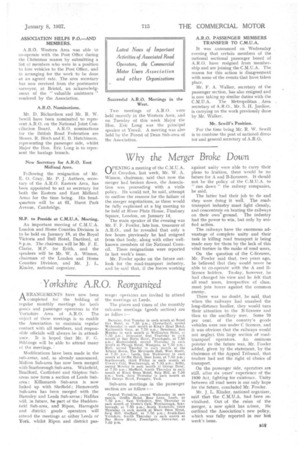Why the Merger Broke Down O PENING a meeting of the
Page 33

If you've noticed an error in this article please click here to report it so we can fix it.
C.M.U.A. at Croydon, last week, Mr. W. A. Vie'inson, chairman; said that now the merger had broken down, the Association was proceeding with a virile policy. He would not, he said, attempt to outline the reasons for the failure of the merger negotiations, as these would be fully explained at a big meeting to he held at River Plate House, Finsbury Square, London, on January 14.
The main speaker of the evening was Mr. F. F. Fowler, late hon. treasurer of A.R.O., and he revealed that only a few hours previously he. had resigned from that body, along with other wellknown members of the National Council. These resignations were reported in last week's issue.
Mr. Fowler spoke on the future outlook for the road-transport industry, and he said that, if the forces working against unity were able to carry their plans to fruition, there would be no future for A and B-licensees. It should not be the policy of the C.M.II.A. to " run down" the railway companies, he said.
The latter had their job to do and they were doing it well. The roadtransport industry must fight cleanly, and concentrate on beating the railways on their ownground. The industry had the power to win, but only by unified action.
The railways have the enormous advantage of complete unity and their task in killing road transport is being made easy for them by the lack of this vital feature in the ranks of road users.
On the question of the C-licensee, Mr. Fowler said that, two years ago, he believed that they would never he able to co-operate" with the A and Blicence holders. To-day, however, he had changed his view and he felt that all road users, irrespective of class, must join forces against the common enemy.
There was no doubt, he said, that when the railways had smashed the long-distance haulier, they would turn their attention to the B-licensee and then to the ancillary user. Some 70 per cent, of the country's goods vehicles were run under C licences, and it was obvious that the railways would not neglect this large section of roadtransport operators. An ominous pointer to the future was, Mr. Fowler added, given by the statement, by the chairman of the Appeal Tribunal, that traders had not the right of choice of transport.
On the passenger side, operators arc still, -after six years' experience of the 1930 Act, fighting for existence. Unity between all road users is our only hope for the future, concluded Mr. Fowler,
Mr. J, L. Kinder, national organizer, said that the C.M.U.A. had been revitalized. Out of the ruins of the merger, a new spirit has arisen. He outlined the Association's new policy, which was fully reported in our last week's issue.




























































































